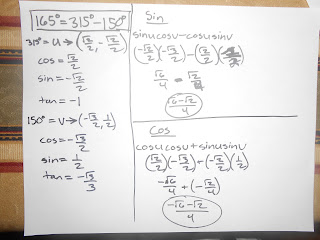This problem is about finding the trig function of an inverse trig function. The "type 2" problem I made and solved above comprises of using Unit Circle values to easily find the trig function values inside the parenthesis.
Pay close attention to the fact that I used the 1st quadrant angle for sin v = 0 instead of the 2nd quadrant angle. If I chose the second one then the answer will be different but it would not be necessarily wrong.









.JPG)
.JPG)
.JPG)
.JPG)
.JPG)

.JPG)
.JPG)